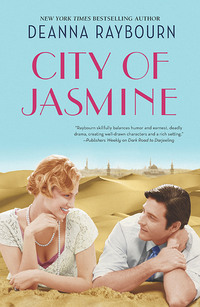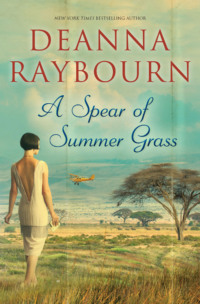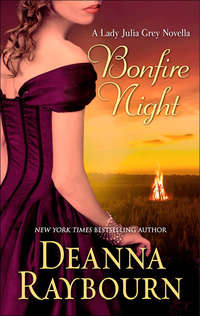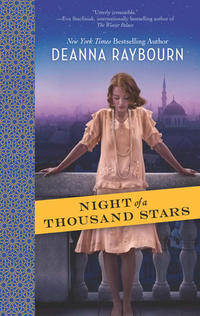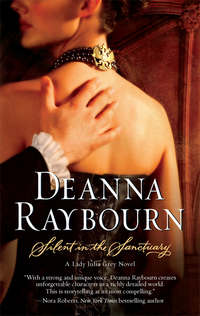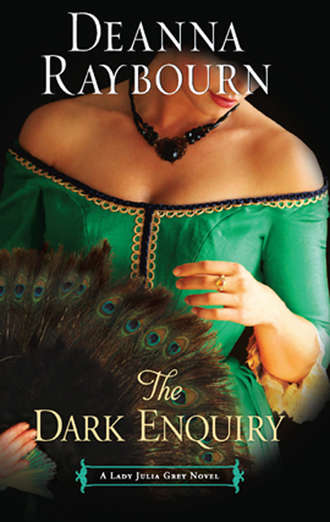
Полная версия
The Dark Enquiry
Brisbane towed me as far as the bed, where he dropped me as if I weighed no more than a feather. I blinked up at him and he braced his hands upon the bedposts, clenching so hard his knuckles turned white and I heard the bones cracking.
He leaned forward, the crescent-moon scar on his cheekbone standing out in livid relief against the smooth olive of his skin. I had never seen his eyes so fathomlessly dark, so implacable. Usually Brisbane’s temper was cold, his rages controlled, but this night, he burned with it, the heat of his anger fairly radiated from him, scorching me where I sat.
“I do not know where to begin,” he ground out. “I have never lifted a hand to you in anger, but you must know what it is costing me not to beat you within an inch of your life.”
“Brisbane,” I began, my tone deliberately soothing.
I reached a hand and he shied as if I had burned him. “Do not think to wheedle me. I have been soft with you, Julia. I have looked past deeds other men would have whipped you for and I have laughed. I have allowed you to take chances that might well have got you killed, and this is the coin with which you choose to repay me.”
“Do not say that,” I protested. “I have taken every precaution to preserve my safety. And the chances I take are nothing compared to the risks you collect! And do not attempt to turn this back upon me when you have lied to me,” I flung.
It was a hit, a palpable one, for he rocked back. “What do you mean?”
“My brother called upon you, and you gave me a lie when I asked if you had seen him. You cannot deplore my subterfuges when you force me to employ them,” I explained calmly. It was a gambit only. I pretended to coolness so he could not see how deeply his emotion had affected me. If he had pressed his anger just a moment further, my poise would have deserted me, of that I had no doubt. I had no skill for anger. My father was a gentle soul, whose occasional bad moods were something his children laughed about. My previous husband had given me a taste of violence and I had found it completely unnerved me. Until this moment, Brisbane’s rages were something that excited me. To arouse passion, of any sort, in a man like Brisbane felt like an accomplishment.
But this was no accomplishment, I realised as I saw the naked anguish in his eyes. He dropped his hands from the bedposts.
“I gave him my word,” he said simply, each word bitten off sharply.
“I have no doubt of it, and it is to your credit that you kept it. But I am no child to be cossetted and protected from everything that is dark and dangerous. If you cannot tell me the truth, at least own that you cannot and do not lie to me! I would not have liked it if you had told me you were bound to silence, but I would have respected it.”
Derision twisted his lip. “Now who gives a lie? You would have done precisely the same as you did tonight if I had given you half an answer. Do not deny it.”
I nibbled at my lip. He was, of course, correct. If I had known he was investigating on behalf of Bellmont, it would have made no difference. I would have acted the same as when I believed Brisbane himself was in danger.
“Perhaps you are correct,” I conceded.
“Perhaps?” One brow arched in enquiry. I did not rise to it. I merely dropped my head and contemplated the toes of my boots.
“I did not mean to frighten you,” I said softly. “I never imagined things would go so far. I only thought to follow you and be at hand if you had need of me.”
He cocked his head. “Because you believed I was in trouble.”
“A point which caused you no end of amusement when we were in the materialising cabinet,” I pointed out.
“It does not seem quite so funny now,” he commented. “But that was before that stupid French charlatan got herself killed.”
He was calmer now, the heat of his anger cooling just a bit. I ventured a question.
“Why could nothing be done for her? It was so dreadful just watching her die.”
He fixed me with a curious look, and I saw something there that told me his anger was not quite so cool as I thought.
“You found that dreadful, and yet you still question my wisdom in excluding you from such things? I have seen a thousand uglier deeds than that, my dear, and I carry memories that would turn the sanity of any man. Yet still you defy me.”
“I do not know what to say.” I spread my hands. “The situation was not at all what I expected, but neither I think was it entirely to your expectations,” I ventured carefully. “You did not look to Madame to be murdered tonight.”
“But I knew it was a possibility,” he said evenly.
“And you could not prevent it?” Too late, I heard the note of horrified accusation in my voice.
He stared at me a long minute, his emotions now carefully held in check, his expression as neutral as a chess king.
“Some people do not deserve to be saved,” he replied.
I said nothing, for there was nothing to say.
After a moment, he roused himself and shot his cuffs. “I am going out. You will remain here. I want your word upon it.”
There was no purpose in fighting with him. I was thoroughly exhausted, in mind and body. I wanted nothing more than a hot bath and my bed.
“You have it.”
He regarded me closely. “If you break it, I will keep you here by force the next time, if I have to tie you to the bed myself.”
I did not think even for a moment that he might have been jesting. I licked my lips and nodded. He did not kiss me goodbye, but crossed the room, pausing with his hand upon the knob.
“I am surprised at you,” he added as a parting shot. “You have seen someone die of aconite poisoning once before. Did you not recognise the symptoms?”
He did not wait for a reply. He left, and to his credit, he did not lock me in. He did not have to. I lay on the bed, utterly spent, considering all that we had said and done that night. It did not make for a very edifying inventory, I realised. We had been cruel to each other, each of us lashing out from our own fears until we drew blood from the other. Brisbane’s last remark was particularly barbed. My first husband had died as a result of aconite poisoning, and although it was unkind of him to point it out, he was correct. I ought to have seen it.
Madame had been lavishly sick shortly after eating. She had the same pallor as Edward had, the same convulsions. But I wondered. Many poisons could create a similar effect, some of them quite accidentally administered. Was there a chance Madame had met with her fate unintentionally? But Brisbane had been certain she had been killed with a purpose, and his remark that she did not deserve to live had not been delivered apropos of nothing. He had been uncharacteristically vicious in his speech, but not his thinking. He would have had a good reason for his opinion of Madame, but I had seen nothing in her séance or her conversation with her sister to indicate what evil she might entertain.
Of course, pondering Madame’s fatal evening meant I could avoid thinking of Brisbane and how badly I had blundered once again. I had meant to discover the truth about Bellmont’s call upon Brisbane, and instead I had muddled my way into something else entirely. It was not the first time I had pushed my way into his world, and not the first time I had made him shatteringly angry in doing so. The trouble, I believed, had its roots in our respective pasts. I came from a family too much in each other’s pockets. We Marches were forthright, emotional, feckless and impulsive. We also loved to talk. There was not a thought or deed that went unremarked amongst us. Secrets were short-lived in our family. We made a life’s work of interfering in each other’s business, and then telling the others about it, and with ten children, there was always much to tell.
Brisbane’s upbringing could not have been more different. He was an unwanted child, half Gypsy, half Scot, got in the heat of a passionate and tempestuous marriage that had not even lasted until his birth. His mother had died in gaol, accused of heinous crimes and crying down curses upon her accusers. His father was best unspoken of. His aristocratic Scottish family would not so much as acknowledge he had existed. His name had been struck from the family Bible, and Brisbane himself hovered on the edge of both worlds. He was neither fish nor fowl, for his Gypsy kin felt him too much a Scot, his Scottish family considered him a wild and savage Gypsy brat.
He had brought himself up, leaving his mother before he was ten and living upon his wits since then. He had achieved respectability by his own merit and wealth from his own accomplishments. He had built a life for himself that was larger than any his family could have given him. He was a man in a thousand, ten thousand, for I had never met another like him, and only Brisbane with his passion and his maddening ways could have tempted me again to marriage. I adored him in ways that frightened me, and the notion that frightened me the most was that Brisbane would come to regret marrying me. He had lived so long upon his own that the act of trust was a difficult one for him to master. He had his associates and friends—the redoubtable Monk, the gentle Dr. Bent, and now, perhaps, my brother Plum. His former mistress and my dear friend, Hortense de Bellefleur, was another. That he was capable of love was undoubted. That he could live with it was another matter entirely.
I made up my mind to call upon Hortense at the earliest opportunity and slid into an uneasy sleep, only to rouse as soon as Brisbane returned. I spied from the face of the clock that it was past two.
“Brisbane?” I called softly.
He sat heavily on the edge of the bed. I had turned the fire down before going to sleep, and only the softest glow from the hearth lit the room. His face was thrown into shadowed relief, and I could see his features only in turn. He pulled off one boot and dropped it to the floor.
“The death has been reported to the authorities. There will be a postmortem and an inquest.” The second boot fell.
“Good,” I said fervently. “Even if she was dreadful, her sister deserves to know what happened.”
He said nothing as he stripped off his clothes, draping them over the chair by the hearth. He was, as ever, casual about his nudity, but the sight of him never failed to distract me completely. My first husband had been pale and slender, like a statue of a youthful prince, waiting for his throne. Brisbane was a king through and through, a man fully in possession of his powers, and I watched the play of shadow over his sleek muscles. He slid under the bedclothes, and to my relief, reached an arm to me. I rolled close, pillowing my head upon the hard curve of his shoulder as his arm came around me.
“I am sorry,” I murmured.
“I know. I ought not to have threatened to beat you,” he returned. He pressed a kiss to my hair.
“I just cannot bear to be kept out of your life,” I said into the dark.
He gave a sigh. “Julia, you daft woman. When will you understand? You are my life.”
It cost him something to say it, for Brisbane’s declarations were always a thing of pain to him, wrenched by some force, as if he were Samson, giving up his strength a lock at a time with his words.
I said nothing, pressing closer and easing myself on top of him. We were silent, but in our silence was desperation, feverish and sharp, and when we spent ourselves and lay, damp and exhausted in each other’s arms, we were silent still.
The SIXTH CHAPTER
Rest, rest, perturb’d spirit.
—Hamlet
The next morning, Brisbane was up and gone before I descended to breakfast. Aquinas entered with tea and toast as I helped myself to eggs from the sideboard. As a very superior butler, he made no allusion to events of the previous evening. It fell to me to raise the subject we were so carefully avoiding.
“I do hope the rest of the staff were not disturbed by our arrival last night,” I began.
Aquinas poured out the tea and tidied up the various pots of jam and honey. “Not at all, my lady.”
“Hmm. Did they happen to notice anything amiss?”
Aquinas gave me a kindly smile. “It is beneath the dignity of a member of staff to notice or remark upon the activities of the family,” he reminded me.
I took a piece of toast, crumbling it in my fingers. “I suppose. I should hate for the new members of staff to think that such goings on are typical of this house.”
Aquinas’ lips thinned a little as he folded Brisbane’s newspaper. I dropped the toast. “Oh, very well. You’d best prepare them that such things are entirely typical. That the mistress will occasionally dress in boy’s clothes, that the master has been known to disguise himself as a pedlar or a beggarwoman, that we keep ravens in the morning room and that from time to time, we are menaced by murderers and thieves and blackmailers and villains of every description,” I said, flinging up my hands in exasperation.
“I have already done so, my lady,” he informed me. “And I have hired the staff at a premium to accommodate the inconvenience.”
“Oh, well done,” I murmured. “Are we fully staffed then?”
“All but the tweeny,” he acknowledged. “She gave notice yesterday on account of the telephone device that has been installed under the stairs. She thinks it an ungodly and heathenish apparatus and will not remain in a house where one is in use.”
I snorted. “Any other domestic troubles? Have we a new cook yet?”
“I am assured by Mrs. Potter that a new cook will be in residence by this afternoon. We are also lacking a valet for the master, although Mr. Brisbane is quite gracious about my own efforts in that capacity.”
Aquinas had been acting as valet to Brisbane for some weeks, although it was not entirely fair to expect him to continue to do so. The duties of a butler were onerous at times, particularly in our establishment, and Brisbane could be exacting about his clothes. Of course, he also managed perfectly well by himself without a valet when necessity demanded it. On our honeymoon, he had availed himself of hotel valets and shipboard stewards to see to his clothes, but I had seen him just as impeccably turned out whilst camping at an archaeological site in Turkey or pursuing a murderer in the Himalayas as in any London ballroom.
Aquinas went on. “Furthermore, Mr. Brisbane and I discussed the matter this morning, and I suggested a pair of footmen for messages and carrying packages, with the notion that one or both could serve as valets as needed.”
“And he was amenable?” I asked.
Aquinas whisked away invisible crumbs from the tablecloth. “Not at first. He pointed out that he is accustomed to living rather more simply, and did not immediately grasp all of the advantages to keeping a pair of footmen on staff.”
“Advantages?”
Aquinas took up the empty pan of eggs and retreated as far as the door, giving me a smile that was almost, but not entirely, correct. “As it is the custom for fashionable ladies of rank to take a footman with them upon leaving the house, I pointed out to Mr. Brisbane that it would be far easier to ensure your ladyship’s safety with a footman in attendance at all times.”
I gave a squawk of protest. “Aquinas, tell me you did not!”
He straightened himself to his full—if diminutive—height. “I do not think that my lady fully comprehends the depth of regard in which she is held by every member of this establishment,” he said firmly. “Her safety and comfort are our highest duty.”
With that, he took his leave, and I could not scold him. I knew Aquinas was deeply affected whenever he resorted to addressing me in the third person. Besides, I mused as I crunched into a piece of toast, it was rather better to have one’s husband and staff devoted to one’s safety than the opposite, but I could not like the feeling that I was being slowly bound up in chains. Velvet chains, but chains to be sure.
After a hasty breakfast, I summoned Morag and the town coach and made my way to the house of my dear friend, Hortense de Bellefleur, in the pretty little neighbourhood of St. John’s Wood. Her elderly maid, Terese, admitted me and carried Morag off to the kitchens for a good gossip. Hortense—Fleur to her friends—rose and greeted me with alacrity.
“Julia!” she cried, her lilting French accent rendering my name something lovelier than it usually sounded in English. “How happy I am to see you.”
I went to her and kissed her cheeks, feeling suddenly ashamed of myself. I had not seen her in such an intimate setting in far too long. Our friendship had been a prickly one. I had come to terms with the fact that she had once, many years ago, been Brisbane’s mistress, and I knew their friendship was nothing more than a deep affection on both sides. She was almost twenty years his elder, and the attraction had been easy enough to understand. She had been a glamorous widow, a lady of the world, both exciting and kindly for a very youthful Brisbane. She had cared for him when his migraines bedevilled him, and she was one of the few, the very few, who knew the story of where he had come from and how he had made his way in the world.
No, I had learned to look past her affaire with my husband in his youth. It was her liaison with my father that had raised my hackles. They had met when I was convalescing at my father’s house after nearly losing my life at the conclusion of the investigation into my husband’s murder. To my astonishment, they had struck up an immediate friendship, and then something more. By the time I had returned from a six-month sojourn in Italy, she had become his paramour. The relationship was a terribly discreet one, but the family were still scandalised. Fleur had made her way in life as little better than a courtesan, taking up with men of power and influence and wealth. Some of them she had married, some of them she had merely entertained. The difference between Fleur and a true professional was that she always fell in love with her admirers, my father included. Ultimately, their relationship drifted, and as a result, I found my own relationship with her had regained some of its previous warmth. We resumed our correspondence throughout my travels, and I had looked forward to each of her chatty, engaging letters.
But they were no substitute for the genuine pleasure of her company, and as she hugged me to her, I felt a surge of the old affection take hold.
“My dear girl,” she said, drawing back, and I saw her beautiful eyes were bright with unshed tears. “Sit! I will have Terese bring a pot of chocolate and it will be like the old days.”
Guilt lanced me then. I had been uncomfortable with her connection to my father, and I had used that as a pretext for cooling my friendship with her. But I had missed her terribly, and apparently the feeling was mutual. I ought to have overlooked it, I scolded myself. I ought to have done more to support her. She was my friend, and although the house in St. John’s Wood was pretty and comfortable, it struck me that it must sometimes be lonely, for Fleur’s company was beyond the pale for respectable society ladies.
“That would be lovely,” I told her truthfully, and we chatted of trivial things until Terese appeared with the pot of chocolate and a plate of dainty feather biscuits.
When we were alone, Fleur poured out with graceful gestures, and permitted me to sip deeply from the cup before she took up her needlework. She had taken to doing whitework to pass the time, and I marvelled at her deft and graceful stitches, so precise and very nearly impossible to see rendered as they were in white silk on a background of white linen. I admired her latest creation and we chatted for a few moments of inconsequential things.
Then, her eyes upon her work, she said gently, “Nicholas was here this morning.”
I flicked her a look of surprise. “Was he indeed?”
She continued to stitch, her hands never varying in their slow, precise rhythm. “I want you to know I would never keep such thing a secret from you, nor would he want me to. He loves you quite devotedly.”
I set down my cup with a resounding crack. “Fleur, I have never, would never, suspect you of resuming your attachment to Brisbane. You shared something twenty years ago, but you have both grown far beyond that. And you are two of the most loyal people I know. Your affection for me would prevent either of you ever from acting upon any such impulse.”
The lovely face diffused into a smile. “I am so glad you know this! You are very right. My passion for Nicholas burned itself out very quickly. We were too different, or perhaps too much alike. I never knew. I only knew that the physical attraction we held for one another did not endure. Only the affection remained. For me, he is like a son now. Well, perhaps not a son. A nephew,” she added with a generous smile.
That she could speak of such things without blushing I put down to her French blood. She was the only person in Brisbane’s life who referred to him by his Christian name, and it struck me then that any other woman might have been jealous. For my part, I was glad for what he had shared with Fleur. She had been the first woman to offer him unfettered affection. It pained me to think of how solitary his life had been before he had met her, and how little feminine kindness he had known before their liaison.
“Of course,” she went on, “his attachment to you is entirely different. I think the physical passions will be quite enduring with the two of you.”
“Fleur, really,” I murmured.
She gave a little laugh, the light peal of silvery bells. “I have embarrassed you—how pretty you are when you blush! But I am too much a woman of the world not to know a man entirely enthralled when I see it. You have bewitched him, my dear. And I congratulate you. It is not easy to keep a man of that mettle. I have tried,” she said ruefully, and I knew she was not talking of Brisbane.
“My father,” I guessed.
She gave a little shrug and put on a brave smile. “Hector is a magnificent man. But it was not to be,” she said lightly.
I shuddered slightly to hear my father described so, but I was glad she had appreciated his better qualities, if only for a little while. “I am sorry that he broke off the connection,” I offered. “Perhaps he is out of the habit of romance. It has been so long since my mother died.”
It was a sorry excuse, but the best I could offer her. Sitting in her exquisite, sunlit morning room, surrounded by her elegance and her warmth, it seemed impossible to me that he could have been so stupid as to cast off her affections. But then, my father had never been renowned for doing the sensible thing, I mused with some irritation.
She shrugged again and let the comment pass. “Nicholas is worried about you.”
I sighed. “I am worried about him. That is why I have come. I wonder sometimes if we did not make a terrible mistake in our marriage.”
She cocked her head to the side. “Why do you say such a thing? You love him, he loves you. These are the only facts which matter.”
“I wish it were as simple as that.” I spread my hands. “I want so badly to be part of his life, his real life—his work. And he promised I could help him with investigations if I applied myself to certain studies. I have done so, and I have proven in the past that I can be useful, to a surprising degree at times. And yet still he fights me, conceals things from me. He forces me to blunder about in secret, a far more dangerous approach,” I pointed out, warming to my theme, “and then he is enraged when I do. There is no winning with him.”
Конец ознакомительного фрагмента.
Текст предоставлен ООО «ЛитРес».
Прочитайте эту книгу целиком, купив полную легальную версию на ЛитРес.
Безопасно оплатить книгу можно банковской картой Visa, MasterCard, Maestro, со счета мобильного телефона, с платежного терминала, в салоне МТС или Связной, через PayPal, WebMoney, Яндекс.Деньги, QIWI Кошелек, бонусными картами или другим удобным Вам способом.


